February 27, 2017 •
Supreme Court Affirms, Without Written Opinion, Lower Court’s Ruling Regarding Campaign Finance Disclosure
Today, the United States Supreme Court affirmed electioneering communication disclosure requirements under the Bipartisan Campaign Reform Act (BCRA). In Independence Institute v. FEC, the Supreme Court affirmed, without a written opinion, a lower court’s summary judgement against Independence Institute, a […]
 Today, the United States Supreme Court affirmed electioneering communication disclosure requirements under the Bipartisan Campaign Reform Act (BCRA).
Today, the United States Supreme Court affirmed electioneering communication disclosure requirements under the Bipartisan Campaign Reform Act (BCRA).
In Independence Institute v. FEC, the Supreme Court affirmed, without a written opinion, a lower court’s summary judgement against Independence Institute, a Colorado based 501(c)(3) tax-exempt organization. Independence Institute argued the BCRA’s disclosure requirements for electioneering communications were overbroad and violated the First Amendment.
Electioneering communication is defined as any broadcast, cable, or satellite communication referring to a clearly identified federal candidate, made within 30 days of a primary election or 60 days of a general, special, or runoff election, and targeted to the relevant electorate.
On November 3, 2016, the U.S. District Court for the District of Columbia had rejected the Independence Institute’s challenge to the BCRA’s electioneering communication provisions and granted the Federal Election Commission’s motion for summary judgment.
January 11, 2017 •
Supreme Court Issues Stay on Special Elections in North Carolina
Yesterday, the U.S Supreme Court issued a temporary stay on a lower court order to hold special elections in November 2017 for North Carolina General Assembly seats in unconstitutionally gerrymandered districts. The temporary stay of the lower court’s decision will […]
 Yesterday, the U.S Supreme Court issued a temporary stay on a lower court order to hold special elections in November 2017 for North Carolina General Assembly seats in unconstitutionally gerrymandered districts.
Yesterday, the U.S Supreme Court issued a temporary stay on a lower court order to hold special elections in November 2017 for North Carolina General Assembly seats in unconstitutionally gerrymandered districts.
The temporary stay of the lower court’s decision will remain in place until the justices decide whether to consider a previously filed appeal from state officials. If the Supreme Court hears the case and overturns the ruling, the special elections would be canceled and current districts restored for the 2018 election.
October 14, 2016 •
U.S. Supreme Court Declines to Hear Colorado Campaign Finance Case
The U.S. Supreme Court recently denied the state of Colorado’s petition for review of a 2016 federal appeals court ruling regarding state campaign finance rules. In Coalition for Secular Government v. Williams, the United States Court of Appeals for the […]
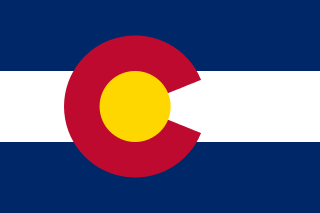 The U.S. Supreme Court recently denied the state of Colorado’s petition for review of a 2016 federal appeals court ruling regarding state campaign finance rules.
The U.S. Supreme Court recently denied the state of Colorado’s petition for review of a 2016 federal appeals court ruling regarding state campaign finance rules.
In Coalition for Secular Government v. Williams, the United States Court of Appeals for the 10th Circuit affirmed a lower court’s ruling declaring the state’s issue committee regulatory framework unconstitutional as applied to the plaintiff, but declined to address the facial validity of the Colorado Constitution’s $200 threshold for issue committee reporting. The strength of the public’s interest in issue committee disclosure depends, in part, on how much money the issue committee has raised or spent.
The appeals court agreed with the 9th Circuit’s characterization of the sliding scale by noting “. . . the value of this financial information to the voters declines drastically as the value of the expenditure or contribution sinks to a negligible level. As the monetary value of an expenditure in support of a ballot issue approaches zero, financial sponsorship fades into support and then into mere sympathy” [Appellate Case: 14-1469; see Canyon Ferry Rd. Baptist Church of E. Helena, Inc. v. Unsworth, 556 F.3d 1021, 1033 (9th Cir. 2009)].
The Supreme Court declined to hear a challenge to a Mississippi campaign finance law requiring individuals or groups to report expenditures of $200 or more to support or oppose a ballot measure. Five residents of Mississippi sued the state in […]
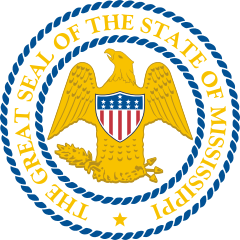 The Supreme Court declined to hear a challenge to a Mississippi campaign finance law requiring individuals or groups to report expenditures of $200 or more to support or oppose a ballot measure.
The Supreme Court declined to hear a challenge to a Mississippi campaign finance law requiring individuals or groups to report expenditures of $200 or more to support or oppose a ballot measure.
Five residents of Mississippi sued the state in 2011, claiming the reporting requirement was too burdensome and infringed on their rights of free speech and association.
A federal judge agreed, stating such requirements overly burdened smaller groups, but was overturned on appeal.
April 4, 2016 •
One Person, One Vote Ruling by U.S. Supreme Court
Today, the U.S. Supreme Court unanimously decided a state or locality may draw its legislative districts based on the total population of all people rather than based on only the population of registered voters. In Evenwel v. Abbott, appellants argued […]
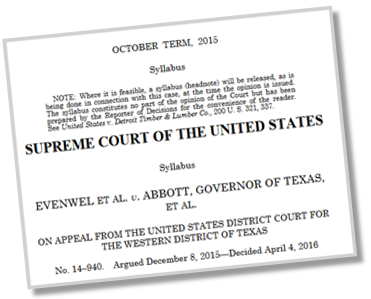 Today, the U.S. Supreme Court unanimously decided a state or locality may draw its legislative districts based on the total population of all people rather than based on only the population of registered voters.
Today, the U.S. Supreme Court unanimously decided a state or locality may draw its legislative districts based on the total population of all people rather than based on only the population of registered voters.
In Evenwel v. Abbott, appellants argued apportionments based on total population for drawing Texas Senate legislative districts diluted their votes in relation to voters in other state Senate districts. They argued such dilution was a violation of the one-person, one-vote principle of the Equal Protection Clause.
While the Court found the apportionment was constitutionally drawn, the decision, written by Justice Ruth Bader Ginsburg for six of the Justices, explicitly stated it does not address whether “states may draw districts to equalize voter-eligible population rather than total population.” Justices Clarence Thomas and Samuel Alito each issued separate concurring opinions. The Court decision is available here.
February 24, 2016 •
The Supremes
What are the qualifications for becoming a Justice on the Supreme Court? There are no requirements listed in the Constitution to be a Supreme Court Justice. The youngest Associate Justice was Joseph Story. He joined the bench in 1811 at […]
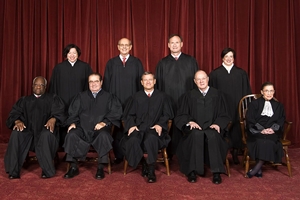 What are the qualifications for becoming a Justice on the Supreme Court?
What are the qualifications for becoming a Justice on the Supreme Court?
There are no requirements listed in the Constitution to be a Supreme Court Justice. The youngest Associate Justice was Joseph Story. He joined the bench in 1811 at 32 years old. The oldest justice was Associate Justice, Oliver Wendell Holmes Jr. who retired after serving 32 years at 90 years old. All justices have been lawyers prior to joining the court. To this point there have been six justices that were foreign born.
Where did we find someone to nominate as a Supreme Court Justice?
On the current bench Chief Justice, John Roberts, Jr, Associate Justice, Ruth Bader Ginsburg, Associate Justice, Sonia Sotomayor, and Associate Justice, Elena Kagan are all from New York. Associate Justice, Samuel A. Alito, Jr is from New Jersey. Associate Justice, Stephen Breyer and Anthony Kennedy are from California. Associate Justice, Clarence Thomas is from Georgia.
What is the range of time it takes to confirm a justice?
Believe it or not, there are many who were confirmed and sworn in on the very day they were nominated. The most recent was Associate Justice Harold Burton during the Truman administration.
The longest amount of time recorded to go from nomination to a successful confirmation was Associate Justice, Louis Brandeis from the Woodrow Wilson administration at 125 days.
How many were nominated that didn’t achieve confirmation?
From the President George Washington administration thru the President George W. Bush administration there have been 34 that did not get confirmed. The various reasons include the following:
- Withdrawn as a nominee
- Rejected by Congress
- Declined to serve
How many Justices died in office?
Justices are appointed for life. Fifty have retired or resigned on their own accord. Only Associate Justice, Samuel chase has been impeached [1984]. The Senate acquitted him and he remained on the bench until his death six years later.
Associate Justices
Before Associate Justice, Antonin Scalia died on February 12, 2016, there were 26 associate justices who died in office from 1798 – Associate Justice, James Wilson through 1954 – Associate Justice, Robert Jackson.
Chief Justices
A total of 17 men have been the chief justice of the Supreme Court. The longest served was Chief Justice, John Marshall of Virginia [who was nominated in 1801 and died in office in 1835.]
There were eight Supreme Court Chief Justices who died while serving the court. Included in this list are Chief Justice, John Marshall [appointed by President John Adams] died in 1835 at 76 years old. The most recent Chief Justice was William Rehnquist [initially appointed by President Richard Nixon as associate justice and nominated to chief justice by President Ronald Reagan] died in 2005 from throat cancer.
How many vacancies occurred during presidential election years?
Vacancies in the Supreme Court during an election year are not that uncommon. There have been 14 confirmed between Associate Justice, Oliver Ellsworth, 1796 [during the President George Washington administration] and Associate Justice, Anthony Kennedy in 1988 [during the Ronald Reagan administration].
How many U.S. Presidents have also served on the Supreme Court?
There has only been one U.S. President to serve on the Supreme Court and that is President William Howard Taft. Eight years after his failed re-election to the office of president, he was nominated by President Warren Harding to replace Chief Justice Edward White. He served for nine years and resigned due to bad health.
This article has been researched from the following sources:
“7 Things You Might Not Know About the U.S. Supreme Court” by Elizabeth Nix on History.com
“At least 14 Supreme Court justices have been confirmed during election years” by Timothy Lee in Vox
“U.S. Justices and Judges Who Died While Still Holding Office” on PoliticalGraveyard.com
“Biographies of Current Justices of the Supreme Court” on the United State Supreme Court website
“How Long Does It Take to Confirm a Supreme Court Nominee?” in The New York Times
January 19, 2016 •
Appeal Against Ban on Contractor Contributions Denied by U.S. Supreme Court
On January 19, the U.S. Supreme Court denied an appeal arguing against a federal law banning political contributions to candidates from federal contractors. Last year, in Miller v. Federal Election Commission, formerly Wagner v. Federal Election Commission, the U.S. District […]
 On January 19, the U.S. Supreme Court denied an appeal arguing against a federal law banning political contributions to candidates from federal contractors. Last year, in Miller v. Federal Election Commission, formerly Wagner v. Federal Election Commission, the U.S. District Court of Appeals for the District of Columbia unanimously upheld the constitutionality of the law barring contractors from contributing to candidates, parties, and candidates’ and parties’ committees.
On January 19, the U.S. Supreme Court denied an appeal arguing against a federal law banning political contributions to candidates from federal contractors. Last year, in Miller v. Federal Election Commission, formerly Wagner v. Federal Election Commission, the U.S. District Court of Appeals for the District of Columbia unanimously upheld the constitutionality of the law barring contractors from contributing to candidates, parties, and candidates’ and parties’ committees.
Plaintiffs had challenged the constitutionality of 52 U.S.C. § 30119(a)(1), which prohibits any vendors with contracts with the federal government from making political contributions to federal candidates or political parties. The plaintiffs had asked the court to declare the law unconstitutional as applied to individuals who have personal services contracts with federal agencies. Because federal workers who are not contractors may make federal political contributions while contractors performing the same work may not, the suit argued the law violates both the Equal Protection Clause of the Constitution and the First Amendment.
Photo of the United States Supreme Court by UpstateNYer on Wikimedia Commons.
March 24, 2015 •
Wisconsin Voter ID Law Remains, But Not for Spring Election
The U.S. Supreme Court has decided not to hear a case alleging the state’s 2011 voter ID law is unconstitutional. Following the decision, the Government Accountability Board consulted with the Wisconsin Department of Justice and determined photo ID will not […]
 The U.S. Supreme Court has decided not to hear a case alleging the state’s 2011 voter ID law is unconstitutional.
The U.S. Supreme Court has decided not to hear a case alleging the state’s 2011 voter ID law is unconstitutional.
Following the decision, the Government Accountability Board consulted with the Wisconsin Department of Justice and determined photo ID will not be required for the April 7 Spring Election.
Photo ID will be required for subsequent elections, including any special elections in 2015.
October 6, 2014 •
U.S. Supreme Court Will Review Arizona Redistricting Case
On October 2, the U.S. Supreme Court agreed to hear a case concerning whether a state commission created to craft federal congressional districts violates the Elections Clause of the U.S. Constitution. In Arizona State Legislature v. Arizona Independent Redistricting Commission, […]
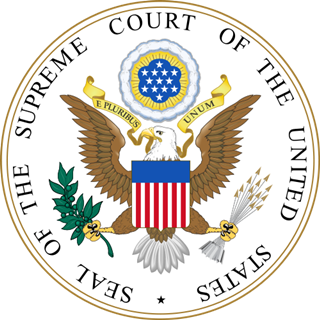 On October 2, the U.S. Supreme Court agreed to hear a case concerning whether a state commission created to craft federal congressional districts violates the Elections Clause of the U.S. Constitution. In Arizona State Legislature v. Arizona Independent Redistricting Commission, a voter initiative amended the state constitution to give the authority of redistricting to a commission rather than the state Legislature.
On October 2, the U.S. Supreme Court agreed to hear a case concerning whether a state commission created to craft federal congressional districts violates the Elections Clause of the U.S. Constitution. In Arizona State Legislature v. Arizona Independent Redistricting Commission, a voter initiative amended the state constitution to give the authority of redistricting to a commission rather than the state Legislature.
In February, a District Court held the Elections Clause does not prohibit Arizona from using a voter initiative to give congressional redistricting authority to a redistricting committee.
October 2, 2014 •
Supreme Court Will Review Florida Judicial Campaign Finance Laws
The U.S. Supreme Court agreed today to hear the case of a former Florida judicial candidate disciplined for violating state law by soliciting campaign contributions in 2009. Lanell Williams-Yulee, who ran for county court judge in Tampa, argues the law […]
 The U.S. Supreme Court agreed today to hear the case of a former Florida judicial candidate disciplined for violating state law by soliciting campaign contributions in 2009. Lanell Williams-Yulee, who ran for county court judge in Tampa, argues the law violates her right of free speech.
The U.S. Supreme Court agreed today to hear the case of a former Florida judicial candidate disciplined for violating state law by soliciting campaign contributions in 2009. Lanell Williams-Yulee, who ran for county court judge in Tampa, argues the law violates her right of free speech.
Currently, Florida and 29 other states prohibit judicial candidates from personally soliciting campaign contributions. Courts are split on the issue with some saying such bans protect the integrity of the courts by ensuring judges remain impartial upon winning election.
A ruling is expected in June 2015.
April 7, 2014 •
Iowa Corporate Contribution Ban Upheld
Corporations in Iowa are still prohibited from making campaign contributions, despite an attempt by non-profit corporation Iowa Right to Life Committee, Inc. to remove the ban. The Supreme Court of the United States denied review of the Eighth Circuit Court […]
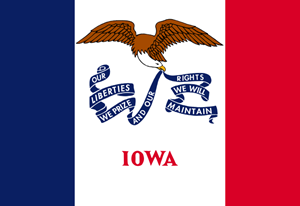
Corporations in Iowa are still prohibited from making campaign contributions, despite an attempt by non-profit corporation Iowa Right to Life Committee, Inc. to remove the ban. The Supreme Court of the United States denied review of the Eighth Circuit Court of Appeals case with no comment.
In Iowa Right to Life v. Tooker, plaintiff Iowa Right to Life alleged the ban on corporate contributions is an unconstitutional bar to free speech and equal protection. The Eighth Circuit did not agree, thus upholding the ban.
April 2, 2014 •
Analysis of U.S. Supreme Court McCutcheon Majority Decision: Aggregate Political Contributions Found Unconstitutional
Today, in McCutcheon v. Federal Election Commission (docket 12-536), the United States Supreme Court ruled aggregate limits on federal campaign contributions are an unconstitutional violation of the First Amendment’s guarantee of political expression and association. Background: Federal law imposes two […]
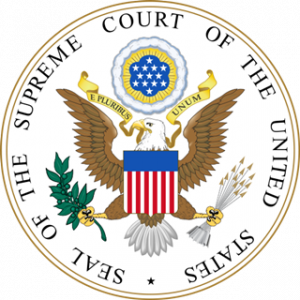
Today, in McCutcheon v. Federal Election Commission (docket 12-536), the United States Supreme Court ruled aggregate limits on federal campaign contributions are an unconstitutional violation of the First Amendment’s guarantee of political expression and association.
Background:
Federal law imposes two types of limits on individual political contributions.
Base limits restrict the amount an individual may contribute to:
- A candidate committee;
- A national party committee;
- A state, local, and district party committee; and
- A political action committee.
Biennial limits restrict the aggregate amount an individual may contribute biennially to:
- Candidate committees; and
- All other committees.
Shaun McCutcheon is an Alabama businessman who regularly makes political contributions to Republican candidates and the Republican National Committee. McCutcheon wanted to contribute $26,200 more to candidates and committees than the aggregate ceiling would allow. The Republican National Committee was also a plaintiff in the suit.
McCutcheon did not challenge the base limits on contributions to individual candidates and entities, but, wanting to give to more candidates and political entities than allowed by law, he challenged the aggregate limits.
Decision:
In a 5-4 decision, with the majority joined by Justice Thomas in a separate concurring opinion, the Court found aggregate limits do not further the permissible government interest in preventing quid pro quo corruption or the appearance of such corruption.
The majority opinion, written by Chief Justice Roberts and joined by Justices Scalia, Kennedy, and Alito, found the aggregate contribution limits do not further the only governmental interest accepted as legitimate in Buckley v Valeo. The 1976 decision by the U.S. Supreme Court found aggregate limits to be a permissible government regulation to curtail corruption or the appearance of corruption.
In McCutcheon, the Court stated, “Congress may not regulate contributions simply to reduce the amount of money in politics.”
The Court equated political contributions with “political campaign speech,” writing, “Money in politics may at times seem repugnant to some, but so too does much of what the First Amendment vigorously protects. If the First Amendment protects flag burning, funeral protests, and Nazi parades—despite the profound offense such spectacles cause—it surely protects political campaign speech despite popular opposition.”
Effect on other jurisdictions: (updated June 16, 2014)
The McCutcheon decision’s effects extend beyond the federal campaign finance laws.
At its May 14, 2014 meeting, the Connecticut State Elections Enforcement Commission announced it would no longer enforce the state’s aggregate contribution limit absent further direction from the General Assembly or a court of competent jurisdiction. The commission stressed, however, the base contribution limits would remain in full force and effect.
In a policy statement dated June 4, 2014, the Maine Commission on Government Ethics and Practices stated it would no longer enforce the yearly $25,000 aggregate contribution limit applicable to individuals and entities contained in Maine Revised Statutes section 1015(3), barring guidance from the legislature or a court. The policy statement noted the commission’s intention to study the issues and perhaps propose legislation during the next legislative session.
The Maryland State Board of Elections issued a guidance memo stating the board would no longer enforce a $10,000 aggregate limit on donors’ contributions to state candidates during a four-year election cycle, while stressing the $4,000 limit on personal contributions to any one candidate was still in place.
The Massachusetts Office of Campaign and Political Finance (OCPF) announced it will no longer enforce the state’s $12,500 aggregate limit on the amount an individual may contribute to all candidates, but will continue to enforce the $5,000 aggregate limit on contributions by individuals to party committees.
A provision in Minnesota’s campaign finance law known as the “special sources limit” will no longer be enforced as applied to individual large donors. U.S. District Judge Donovan Frank issued a preliminary injunction barring enforcement of the law with respect to individual large donors in response to a challenge by the Institute for Justice on First Amendment grounds. Under section 10A.27(11) of the Minnesota Statutes, the special sources limit prohibits a campaign from raising more than 20 percent of its total contributions from lobbyists, political committees, and large donors contributing more than one half of the individual contribution limit. Donovan issued the injunction in light of the precedent set by McCutcheon. The defendants have the opportunity to appeal to the 8th U.S. Circuit Court of Appeals. If they choose not to appeal, the case will proceed to a final ruling at the district court level.
The U.S. District Court for the Southern District of New York struck down a campaign finance law limiting contributions to super PACs. Sections 14-114(8) and 14-126 of the New York Election Law imposed an annual aggregate contribution limit of $150,000 per contributor. Plaintiff New York Progress and Protection PAC challenged the aggregate contribution limits on First Amendment grounds. Citing the precedent established in Citizens United and McCutcheon, the judge enjoined New York’s aggregate contribution limit as an unconstitutional ban on free speech. In its May 2014 meeting, the State Board of Elections determined the $150,000 yearly aggregate limit on political contributions from individuals can no longer be enforced in light of recent federal court decisions. New York campaign finance law imposes a similar aggregate limit of $5,000 on a corporation’s yearly contributions. The board made no ruling with regard to the corporate limit; however that limit is being challenged in federal court.
On April 3, 2014, the Puerto Rico Office of the Electoral Comptroller issued an informational newsletter in light of the U.S. Supreme Court ruling. While the Court referenced similar aggregate limits in other states and jurisdictions, it did not go so far as to declare them unconstitutional. Therefore, the office is not taking any immediate action with regard to the Puerto Rico aggregate campaign finance limits established in 2011. It will request an opinion from the Puerto Rico Secretary of Justice to determine how the Court’s decision relates to Puerto Rico law. The office will issue new informational bulletins as further developments arise.
On April 16, 2014, the Rhode Island Board of Elections voted to support the creation of legislation eliminating aggregate political contribution limits. The vote was in reaction to the McCutcheon decision. State law currently prohibits an individual from making contributions of more than $10,000 in the aggregate to more than one candidate, political action committee (PAC), or political party committee or to a combination of candidates, PACs, and political party committees within a calendar year.
In Vermont, Senate Bill 82 added an aggregate contribution limit of $40,000 per election cycle, which was to take effect January 1, 2015. However, the implementation of the aggregate contribution limit was contingent on the Supreme Court ruling in favor of aggregate limits in McCutcheon. Because the Supreme Court in fact ruled against aggregate limits, Vermont’s aggregate limit will not go into effect.
Wisconsin’s aggregate limits had already been challenged in Young v. Government Accountability Board. The parties in that case agreed to put the case on hold until the McCutcheon decision was issued. Following the ruling, the Government Accountability Board reached a settlement in which it agreed the aggregate contribution limits for individuals and PACs contributing to state candidates were no longer enforceable.
The Wyoming Joint Corporations, Appropriations, and Political Subdivisions Interim Committee ordered a draft bill to repeal the state’s aggregate contribution limits, which conflict with the U.S. Supreme Court’s ruling in McCutcheon.
In light of the ruling in McCutcheon, the Los Angeles Ethics Commission announced it would no longer enforce the aggregate limits on contributions to city and school board candidates. Limits on contributions to individual candidates remain in place.
The San Francisco Ethics Commission adopted a resolution stating it will not enforce the aggregate limit on contributions to city candidates in light of the McCutcheon ruling. The Campaign and Governmental Conduct Code imposes an aggregate limit of $500 multiplied by the number of city elective offices to be voted on in the election. The city’s $500 limit on contributions from an individual to a single city candidate remains in full force.
Analysis:
Quid pro quo corruption narrowly defined:
The Court maintained a narrow definition of quid pro quo corruption, preventing the government from limiting the First Amendment right to make contributions to as many candidates as an individual would like, within the base limits of contributions.
In the decision, the Court marked a solid delineation between corruption and appreciation: “[T]here is a clear, administrable line between money beyond the base limits funneled in an identifiable way to a candidate—for which the candidate feels obligated—and money within the base limits given widely to a candidate’s party—for which the candidate, like all other members of the party, feels grateful. . . . To recast such shared interest, standing alone, as an opportunity for quid pro quo corruption would dramatically expand government regulation of the political process.”
The Court found the possibility that an individual who spends large sums may garner “influence over or access to” elected officials or political parties does not give rise to such quid pro quo corruption.
The Court wrote, “The Government may no more restrict how many candidates or causes a donor may support than it may tell a newspaper how many candidates it may endorse.”
Arguing against the dissent’s argument that corruption could still occur even without the circumvention of the base contribution limits, the majority found such an argument would broaden the definition of quid pro quo corruption. The Court stated the dissent’s interpretation “dangerously broadens the . . . definition of quid pro quo corruption . . . and targets as corruption the general, broad-based support of a political party.”
Circumvention of base limits:
The Court found the argument that aggregate contributions could circumvent base contribution limits unconvincing.
The majority said the basis for allowing the law on aggregate limits to stand falls on “speculative” scenarios of corruption, which the Court found “highly implausible” and “hard to believe.” The Court said “experience and common sense” foreclose on many of the scenarios of schemes to funnel money, including one scenario the District Court found had merit. The Court found, “Based on what we can discern from experience, the indiscriminate ban on all contributions above the aggregate limits is disproportionate to the Government’s interest in preventing circumvention.”
The Court stressed that once an individual reaches the aggregate limit, the law denies “the individual all ability to exercise his expressive and associational rights by contributing to someone who will advocate for his policy preferences.”
Disclosure:
The Court also argued disclosure of contributions “minimizes the potential for abuse of the campaign finance system.”
The majority maintained lifting the aggregate limits encourages money away from entities not subject to disclosure: “Individuals can, for example, contribute unlimited amounts to 501(c) organizations, which are not required to publicly disclose their donors.”
Citing Citizens United, Justice Roberts wrote, “Disclosure requirements burden speech, but—unlike the aggregate limits—they do not impose a ceiling on speech.” In Citizens United, the Court held 8-1 that laws requiring the disclosure of political contribution were constitutional.
Legislative alternatives suggested by the Court:
The majority opinion suggested Congress could create other legislation to curtail circumvention of the base limits, such as enacting legislation targeting restrictions on transfers among candidates and political committees.
Additionally they wrote, “Congress might also consider a modified version of the aggregate limits, such as one that prohibits donors who have contributed the current maximum sums from further contributing to political committees that have indicated they will support candidates to whom the donor has already contributed.”
Overturning Buckley v Valeo’s holding on aggregate limits:
In overturning the 1976 U.S. Supreme Court Buckley v Valeo’s ruling on aggregate limits, the Court found the 38-year-old decision did not thoroughly address aggregate limits in its analysis. The Court also found subsequent laws enacted have “considerably strengthened” statutory safeguards against circumventing base limits through the transfer of contributions between parties and political committees. Additionally the Court argues Buckley did not address the “overbreadth challenge” with respect to the aggregate limits.
The Court rejected an alternative provided in the Supreme Court’s prior Buckley decision finding a person could personally volunteer for a candidate. The majority found “personal volunteering is not a realistic alternative for those who wish to support a wide variety of candidates or causes.”
The Court also heavily relied on campaign finance cases decided in the last few years, such as Citizens United v FEC and Arizona Free Enterprise Club’s Freedom Club PAC v Bennett.
Justice Thomas, in his separate opinion concurring with the majority ruling, writes Buckley “denigrates core First Amendment speech and should be overruled.”
Today the United States Supreme Court ruled that aggregate limits on federal campaign contributions are unconstitutional. In a 5-4 decision, with a separate majority opinion by Justice Thomas, the Court found aggregate limits do not further the permissible government interest […]

Today the United States Supreme Court ruled that aggregate limits on federal campaign contributions are unconstitutional.
In a 5-4 decision, with a separate majority opinion by Justice Thomas, the Court found aggregate limits do not further the permissible government interest in preventing quid pro quo corruption or the appearance of such corruption.
The case, McCutcheon v. Federal Election Commission, sought to allow Shaun McCutcheon to make political contributions to several federal candidates exceeding the two-year aggregate limit set in 2 U.S.C §441a(a)(3)(A). The plaintiff had argued the limit is unconstitutional because it violates a citizen’s right to speak and to associate with not just any candidate, but every candidate of his choosing. The Supreme Court had decided to grant a review of the case in February 2013 and oral arguments were made on October 8, 2013.
Photo of the United State Supreme Court Building courtesy of Mfield on Wikimedia Commons.
February 24, 2014 •
US Supreme Court Ruling on Aggregate Limits of Political Contributions May be Coming Soon
A United States Supreme Court ruling deciding the constitutionally of aggregate limits on federal campaign contributions may be issued as early as this week. The case, McCutcheon v. Federal Election Commission, seeks to allow Shaun McCutcheon to make political contributions […]

A United States Supreme Court ruling deciding the constitutionally of aggregate limits on federal campaign contributions may be issued as early as this week.
The case, McCutcheon v. Federal Election Commission, seeks to allow Shaun McCutcheon to make political contributions to several federal candidates exceeding the two-year aggregate limit set in 2 U.S.C §441a(a)(3)(A). The plaintiff argues the limit is unconstitutional because it violates a citizen’s right to speak and to associate with not just any candidate, but every candidate of his choosing.
The Supreme Court decided to grant a review of the case in February 2013 and oral arguments were made on October 8, 2013.
Photo of the United States Supreme Court Building courtesy of UpStateNYer on Wikimedia Commons.
State and Federal Communications, Inc. provides research and consulting services for government relations professionals on lobbying laws, procurement lobbying laws, political contribution laws in the United States and Canada. Learn more by visiting stateandfed.com.


